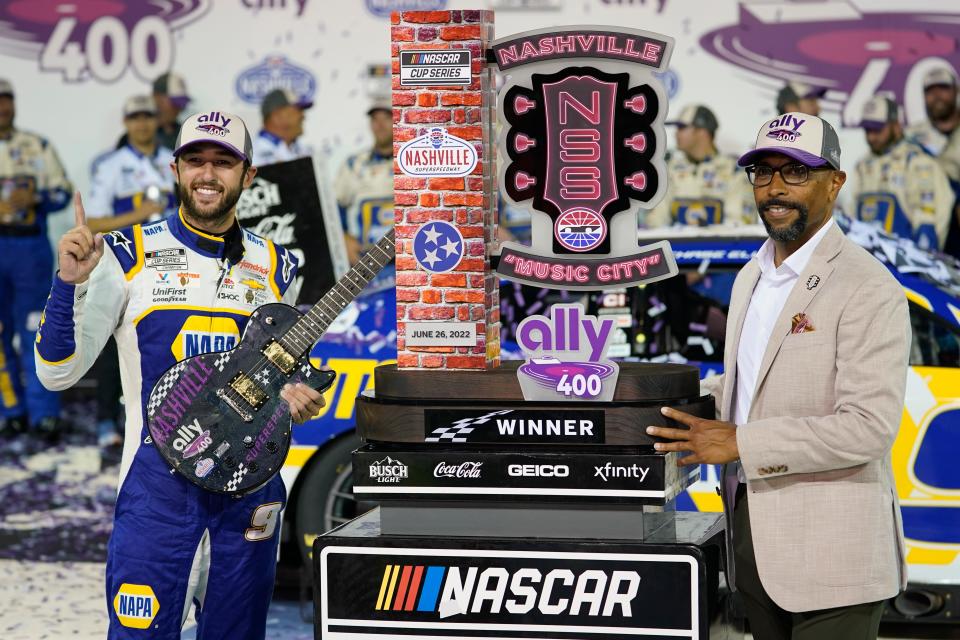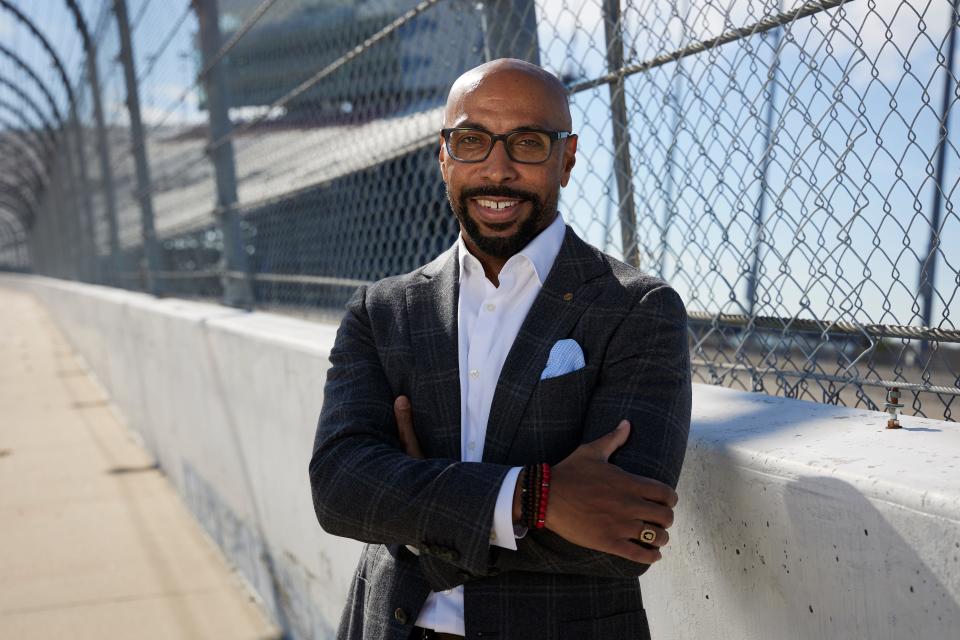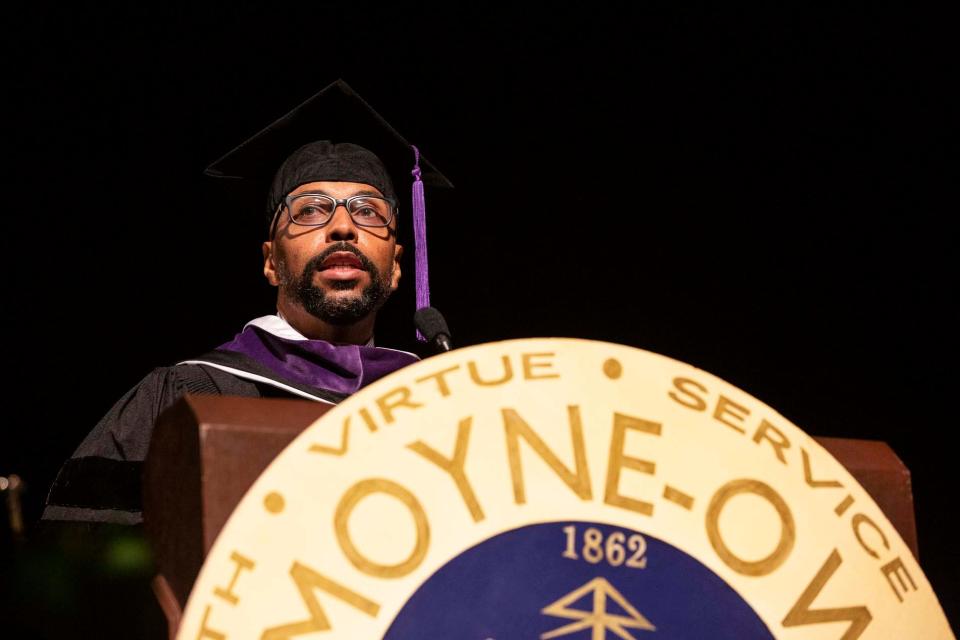Fiesta Bowl names Erik Moses, NASCAR's first Black track president, executive director and CEO
The VRBO Fiesta Bowl named Erik Moses, the first Black track president in NASCAR history, as executive director and chief executive officer on Tuesday morning.
He is the first minority to hold the position in the game’s 50-year history.
“I didn’t set out to be a trailblazer,” Moses said in an interview with The Arizona Republic. “I was looking for the next great opportunity and challenge in my professional journey.”
Moses, 51, has more than 20 years of experience as a sports executive and business leader. He spent the past two years as president and general manager of Nashville Superspeedway, where he helped resuscitate a long-dormant track, turning it into an annual NASCAR Cup Series stop.
Moses previously served as the founding president of the XFL’s DC Defenders and in a variety of roles in the nation’s capital, including CEO of the DC Sports and Entertainment Commission, where he oversaw the formation and founding of the Military Bowl and the AT&T Nation’s Football Classic, featuring Historically Black Colleges and Universities. He was also influential in recruiting Major League Baseball to Washington and the construction of the acclaimed Nationals Park.
“From a resume standpoint, the fact that he served as CEO of the DC Sports and Entertainment Commission jumped off the page because you’re dealing with so many stakeholders,” Fiesta Bowl board chairman Randal Norton said. “You’re dealing with municipalities, you’re dealing with sports teams, venues, event management. The ability to navigate across all of those different stakeholders is really impressive.”
Longtime Fiesta Bowl board member Jim Hatfield will remain interim executive director through this year’s game, which will host a College Football Playoff semifinal on Dec. 31 at State Farm Stadium.
The approach allows Moses a smooth transition into the role.
“In terms of the timing, it almost couldn’t be better,” Moses said. “NASCAR finished its season at Phoenix a week ago, and me closing that chapter during this time of year and then starting this new chapter during bowl season is ideal.

"I get an opportunity to see the organization that is the Fiesta Bowl, from its staff, board members, Yellowjackets and volunteers, all come together the way that they have for decades, without necessarily being in charge of it, being able to observe and take notes and see what’s done well and maybe things that could be done better, but not necessarily have the reins for this year’s games.”
Moses, a native of Greensboro, N.C., earned an undergraduate degree from North Carolina and his Juris Doctorate from Duke University School of Law. He began his career as an attorney and is a member of the bar in Maryland and the District of Columbia. He has also served as an adjunct professor of sports management at Georgetown University and was senior vice president of Events DC, where he managed multiple venues, including historic RFK Stadium.
Moses is a national trustee for Boys & Girls Clubs of America-Southeast Region, on the board of directors for the Nashville Sports Council and in leadership positions for the DC Jazz Festival and Military Bowl Foundation. He is also a member of the NASCAR Industry Diversity Council, Leadership Middle Tennessee, the Rotary Club of Nashville and the board of trustees of Cumberland University.
“We believe he’s going to be an excellent leader,” Norton said, “not only with the Fiesta Bowl, but also in the community.”
Here are excerpts from Moses' interview with the Republic, edited for clarity and brevity.
Q: What was appealing about this job and this challenge?
A: This is a really interesting time in the college sports world, but in the college football landscape in particular. I couldn’t think of a better time to take on a role like this than right now, with the expansion of the college football playoffs, NIL deals, the transfer portal and all of the factors that are affecting that world today, with the idea and the goal of ensuring that the Fiesta Bowl, which has been doing great work and great hospitality and enriching communities in Arizona for 50-plus year, continues to maintain and expand its prominence in the bowl system and the bowl landscape. I’m excited about that challenge.
I’m not certain that I would have taken on this kind of role at another bowl, with all due respect to the other bowls that are out there, and I helped start one in Washington, the Military Bowl. But this one’s special. It’s a special place, it’s a top 10 market, there’s a great staff, great board members, great volunteers. I couldn’t be more excited about getting started.

Q: What did you learn about yourself in Nashville and what lessons did you take from the experience of being the first Black track president in NASCAR history?
A: What that experience confirmed for me was that my ability to build, cultivate, maintain, expand relationships and to be successful in my vocation was not market specific. It was not something that was specific to Washington, D.C. It was something that I was able to do in Nashville in a very short period of time, in an industry that I wasn’t that familiar with, in terms of motorsports specifically. … I didn’t know until the end of the interview process that I was going to be the first Black track president in NASCAR’s 73-year history at that point. I had no idea.
Representation matters for what it can do to inspire others to seek their dreams and to not limit those dreams because they haven’t seen someone who looks like them doing the thing that they want to do. And so I carry that mantle with a lot of pride. I want to not only be someone who helps to crack the door, but who wants to help blow it off the hinges, such that people know that there’s an opportunity to do whatever they want to do, if they’re good at what they do, they work hard, they’re prepared and they act with integrity.
People often expect me to have a Jackie Robinson story, and I don’t. I tell people that’s not my testimony. NASCAR and its fans have been nothing but fantastic to me over the last two years.
Q: What was your experience like when the XFL shut down?
A: It was like grabbing defeat out of the jaws of victory. That job was a dream job at that point. I moved over to the team side. I had a great partner in our coach and GM, Pep Hamilton, who is a son of Howard University, a former quarterback and coach there and is now the offensive coordinator with the Houston Texans. A great guy, a city that I knew and loved, bringing people American’s favorite sport, by far, at a time when there was no football to be had between a week after the Super Bowl and the end of April.
It was really a dream job. And as you know, there was quite a bit and still continues to be quite a bit of discontent around professional football in the nation’s capital. And so there was a very unique opening that we had there and that I believe we took full advantage of, and had it not been for the pandemic, we would have continued to take full advantage and provided a great product to people after the NFL season is over. And I hope, fingers crossed, that when they revive the league next year with Dwayne Johnson and those folks, I hope they’re successful, because I believe they were onto something.
Q: You went to Duke law school because you were interested in being a sports agent and Drew Rosenhaus had gone there, but you were an undergrad at UNC. How do you reconcile being on opposite sides of that rivalry?
A: The way I reconciled it while I was there was that Carolina beat Duke seven consecutive times in basketball when I was there, so it made it real easy to be behind enemy lines. It happens way more often than people think. There were five of us from our graduating class at Chapel Hill that were in my law school class at Duke. It happens a lot, which I’m sure it does at USC-UCLA and Michigan-Ohio State and other places like that. You can’t deny the value of the education and the strength of those educational institutions. It was great to go from the big public school experience to the small private school experience that was only 8 miles away.

Q: What did you take from being raised and educated in that environment on Tobacco Road?
A: It’s the power of sports. The power of sports to affect our lives in ways that quite frankly are outsized to their overall importance in the world, but that grab ahold of us in a way that you can’t deny. I love it. I’ve had the argument with college football fans, and I am one of them, but about whether the Duke-Carolina basketball rivalry is the best rivalry in college sports, or whether it’s Michigan-Ohio State in football. Or USC-UCLA. Or Texas-Oklahoma. I just love it. I love the passion that it evokes from people. I love that sports helps to build bridges between people and communities in ways that few things can.
When this country was a very different place and much more segregated, the notion that people would come to RFK Stadium to see the then-Redskins play and you’d have the Kennedys essentially sitting next to some Black folks from southeast Washington, D.C., in the stands, rooting for the same team, there are very few things that unite us in that way. And I’m just proud and happy to be able to earn a living by putting on events that allow people to find that common ground and to be on the same team, whether it’s for a couple of hours once a week or even more often.
Jason Wolf is a sports enterprise and investigative reporter for The Arizona Republic. Reach him at jason.wolf@gannett.com and follow him on Twitter at @JasonWolf.
Support local journalism. Subscribe to azcentral.com today.
This article originally appeared on Arizona Republic: Fiesta Bowl hires first Black NASCAR track president as executive director

